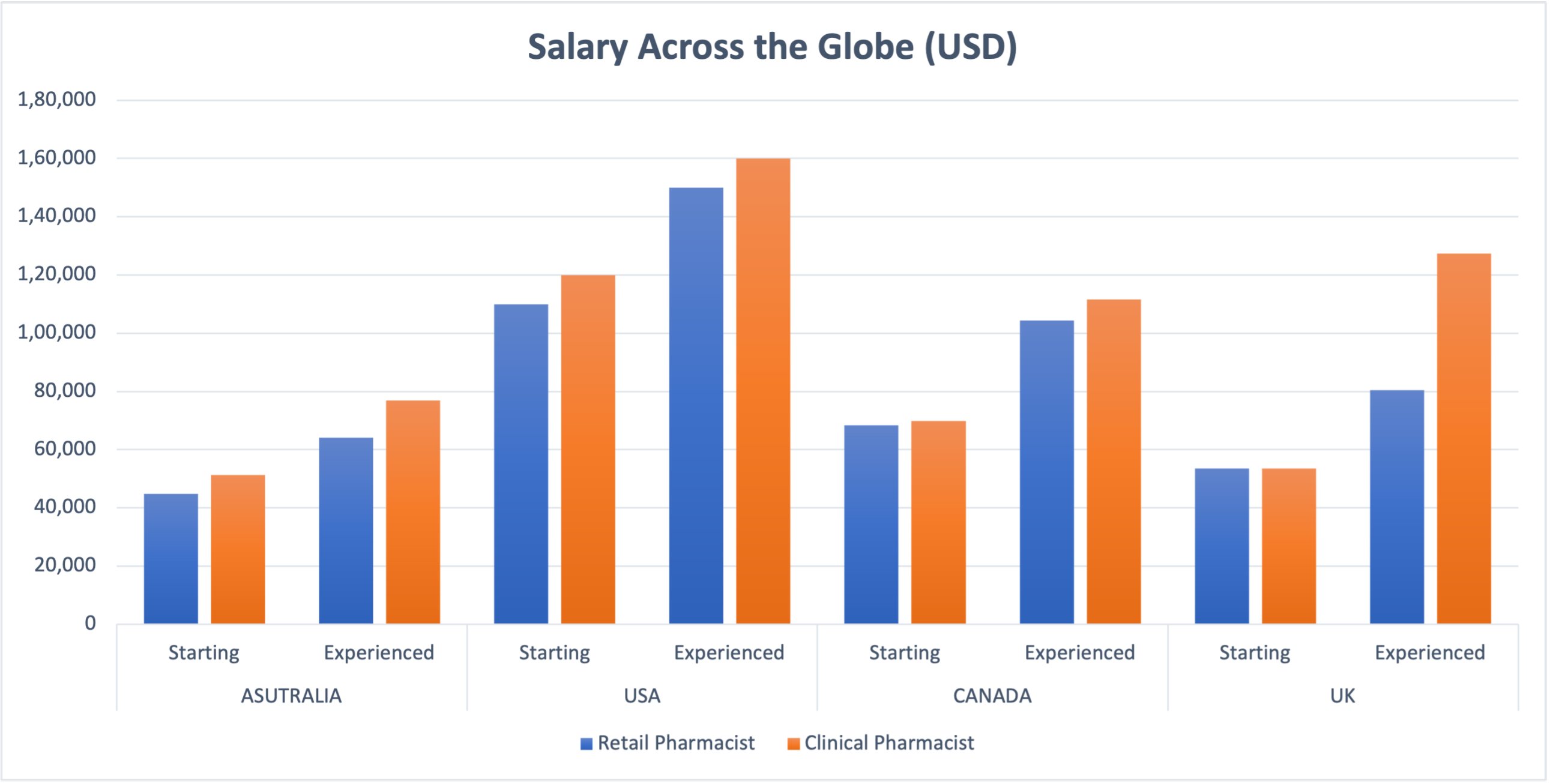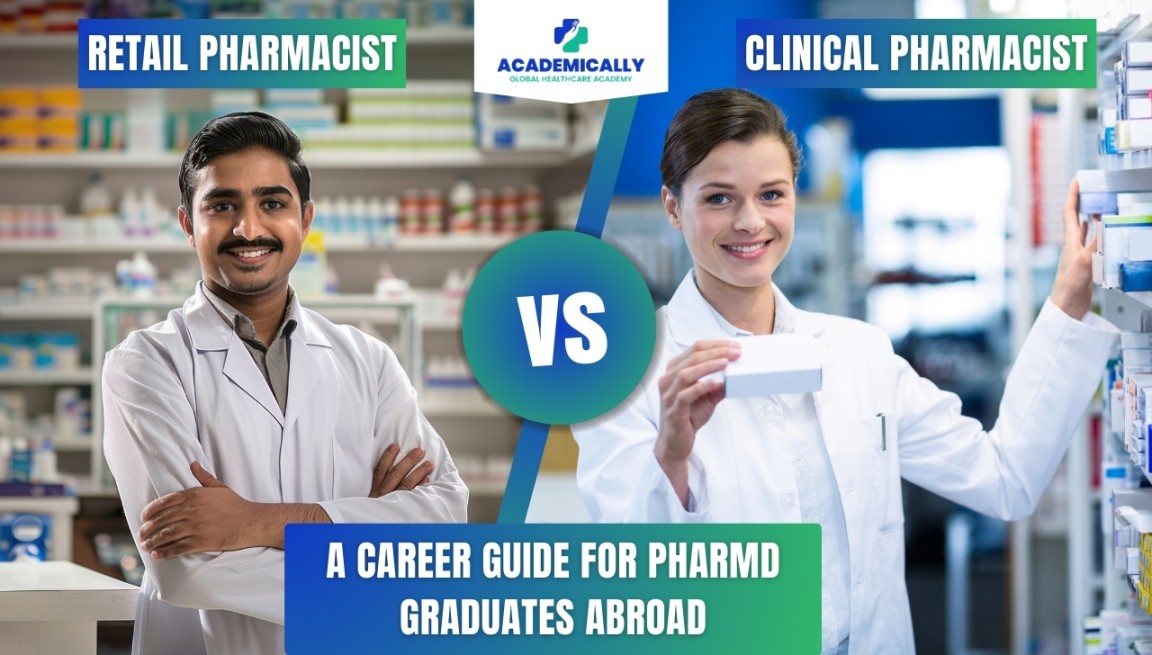PharmD Jobs Abroad- What are your options?
Pharmacists’ career paths after PharmD are numerous when you look at countries like the USA, Australia, and New Zealand. Among the most common options abroad are roles as Clinical Pharmacists and Retail Pharmacists. While both are rewarding, they offer different experiences, opportunities, and career progression.
There are other options, such as consulting and working in the pharmaceutical industry, but they do not necessarily require a PharmD degree. For you to make the best use of your qualifications and knowledge, clinical and retail pharmacist roles will suit you better.
Read on to get a detailed view of both the career options that will help you make an informed decision.
What is a Clinical Pharmacist?
A Clinical Pharmacist works directly with doctors, nurses, and patients in hospitals or healthcare settings. Their role is focused on optimizing patient drug therapy, reviewing prescriptions, monitoring outcomes, and preventing drug interactions.
Key Responsibilities:
- Patient medication review: The main function is to assess the medication prescribed to the patient and identify any issues, such as possible drug interactions or medicines that can be harmful to the patient based on the patient’s medical history.
- Adjusting dosages with physicians: As a clinical pharmacist, you can also adjust the dose in consultation with the prescribing physician if you think that it might work best for the patient.
- Counselling on side effects and drug interactions: This is the most important aspect of the job. You have to educate the patients on the possible side effects of the drug they have been prescribed. This will help them be prepared for any such events.
- Participation in ward rounds: Clinical pharmacists also participate in ward rounds, learn the patient’s medical history, and improve communication between the different healthcare service providers for an improved healthcare experience.
Ideal candidates for the role
Clinical pharmacist is a very hands-on role. You would be in constant contact with the patients, nurses, doctors, and other healthcare professionals. It is more aligned for PharmD graduates who are passionate about patient care, therapeutics, and direct clinical work.
Countries in Demand:
USA, UK, Australia, Ireland, Canada, UAE, Saudi Arabia
What is a Retail Pharmacist?
A Retail Pharmacist typically works in community pharmacies or chain pharmacies. They handle prescriptions, provide basic health advice, and sell over-the-counter medications. While the role is less clinical, it offers flexibility, faster job entry, and a stable income.
Key Responsibilities:
- Dispensing medications: As a retail pharmacist, the main part of the job is to dispense medicines, which are either OTC medications or prescription-based. You need to ensure that the customer provides you with a valid, correctly dated, and in the name of the patient.
- Advising patients on OTC medicines: You are also obliged to inform the customer of any possible side effects or interactions of the medicine with other medications or foods, to prepare them if any such event occurs.
- Inventory and supply management: As a retail pharmacist, you need to manage the inventory of medicines in the pharmacy. You take note of what’s needed, what’s low in stock, and what’s expired and needs to be removed.
- Operating pharmacy software systems: In continuation of the previous role, operating the pharmacy software system is the best way to keep the pharmacy updated. Not only in terms of medication, but also customer records and other logistics.
Who are the ideal candidates?
If you are looking for a quick start and prefer a routine environment, the role of a retail pharmacist might suit you better! Although you will still be in contact with the patient, there is more management involved here. You can always plan to later transition into hospital roles.
Countries in Demand
Australia, Canada, UK, New Zealand, UAE, Ireland
What Are The Best Countries for PharmD Graduates?
Some of the countries with the highest packages for a pharmacist are:
- USA
- Canada
- Australia
- Gulf Countries (UAE, Qatar, Saudi Arabia)
- Switzerland
- UK
- Ireland
Not only are the packages attractive, but the quality of life in these countries is among the best in the world! Some countries, like those in the Gulf, also have a lower cost of living due to tax benefits provided by the government. No wonder, they have the highest number of foreign pharmacists practicing in their healthcare sector.
Now, you might wonder how to get into these countries as a pharmacist. Let us look at some of the assessment exams that you need to clear, country-wise.
| S.No. | Country | Pharmacist Exam |
| 1. | Australia | Overseas Pharmacist Readiness Assessment (OPRA) Exam |
| 2. | USA | Foreign Pharmacy Graduate Equivalency Examination (FPGEE) and the North American Pharmacist Licensure Examination (NAPLEX) |
| 3. | UK | Overseas Pharmacists Assessment Program (OSPAP) and the General Pharmaceutical Council (GPhC) Registration Assessment Exam |
| 4. | Canada | Pharmacy Examining Board of Canada (PEBC) Exam |
| 5. | Ireland | Pharmaceutical Society of Ireland (PSI) Exam |
PharmD Jobs Abroad: What Pays Better?
While Retail Pharmacy may be your first job abroad due to easier access and quicker hiring, Clinical Pharmacy is often considered the ultimate goal for PharmD graduates. The pay difference, working hours, and the nature of work all play in this decision. Ultimately, it’ll depend on you as to what suits you best.
Let’s examine the average salaries of retail pharmacists and clinical pharmacists worldwide, from entry-level to experienced.
| Jobs | Australia | USA | Canada | UK |
| Retail Pharmacist | AUD 70,000-to AUD 100,000+ | USD 110,000 to USD 150,000+ | CAD 95,000 to CAD 135,000+ | GBP 40,000 to GBP 60,000+ |
| Clinical Pharmacist | AUD 80,000-to AUD 120,000+ | USD 120,000 to USD 160,000+ | CAD 97,000 to CAD 140,000+ | GBP 40,000 to GBP 95,000+ |
| Consultant Pharmacist | AUD 100,00+ to AUD 150,000+ | USD 110,000 to USD 190,000+ | CAD 92,000 to CAD 190,000+ | GBP 42,000 to GBP 115,000+ |
Note: Salaries vary by location, experience, and hospital type.

The USA and Canada have some of the highest-paying positions for pharmacists, but this varies across locations and hospitals.
What’s the Process of Becoming a Clinical or Retail Pharmacist?
As you know now, most countries require you to pass the pharmacist assessment before you can be registered and practice. Clinical pharmacist opportunities are a bit more difficult to come by, but it is possible to get one with time and experience.
In countries like Australia, after passing the OPRA Exam (Objective Structured Clinical Examination) and completing the supervised practice period, you become a Registered Pharmacist. Initially, you may work in community pharmacy (retail), but with experience and networking, you can transition to hospital/clinical roles.
Career Progression in Australia:
- Pass the OPRA exam, and then clear your supervised practice session.
- Once you’ve cleared the assessment, you can register with the Australian Health Practitioner Regulatory Agency (AHPRA).
- Work as a retail pharmacist after getting your registration to begin your career.
- After gaining a couple of years of experience, you can move to a Clinical Pharmacist role
- With even more experience as a clinical pharmacist, you can become a Consultant Pharmacist.
Final Verdict
Retail Pharmacy is often your gateway into the international job market after PharmD. However, if you're passionate about direct patient care, Clinical Pharmacy is your calling. Many countries offer smooth transitions between roles once you're licensed.
Your PharmD degree was made for Clinical Excellence — Aim High, Pass Licensing Exams, and Grow!
Want to work as a pharmacist abroad after your PharmD? Start preparing early for licensing exams. Explore opportunities with Academically Global — the world’s #1 platform for healthcare professionals preparing to work overseas. You can book a free session to clear any doubts you may have about the future of your career as a pharmacist. We will be happy to help!





